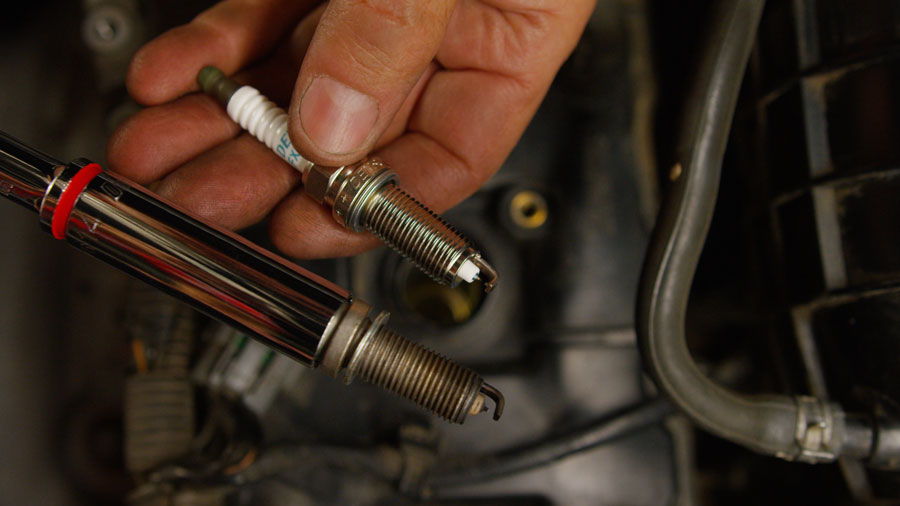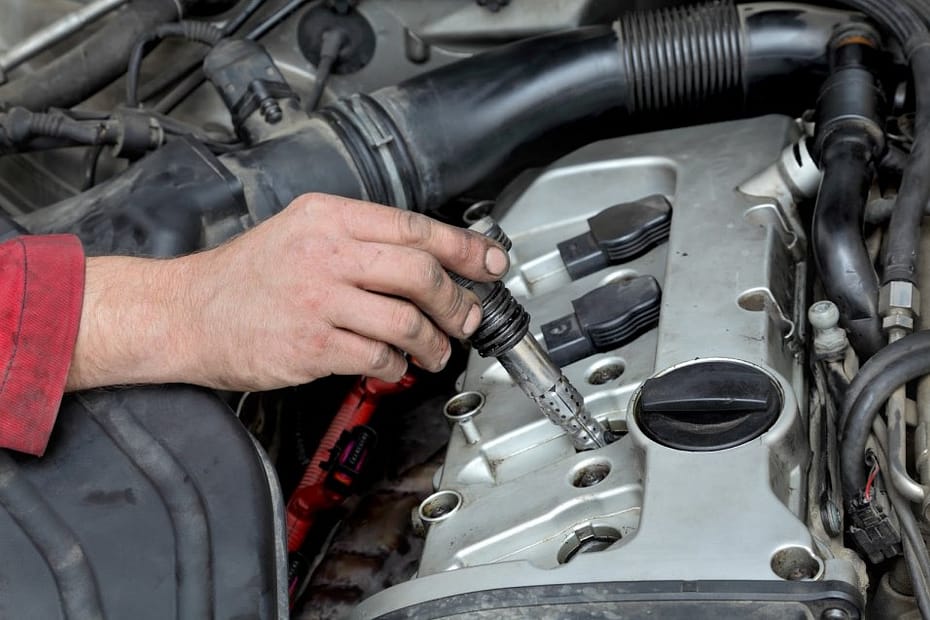Spark plugs go bad due to wear and tear, carbon buildup, or electrical problems.
Signs Of Bad Spark Plugs
When spark plugs go bad, several signs can indicate the problem. You may notice engine misfires, rough idling, or difficulty starting the vehicle. Additionally, poor fuel economy and a significant drop in acceleration can also be indicators of failing spark plugs.
Regular inspection and timely replacement can help maintain optimal engine performance.
Misfiring Engine
A misfiring engine is one of the telltale signs that your spark plugs may be going bad. When spark plugs start to fail, they can cause the engine to misfire. This means that one or more of the cylinders in your engine are not firing properly. As a result, you may notice a loss of power, hesitation, or jerking while driving.
Rough Idle And Acceleration
Another sign that your spark plugs may be going bad is a rough idle and acceleration. When spark plugs wear out or become fouled, they can misfire during idle or when you step on the gas pedal. This can lead to a rough or uneven idle and sluggish acceleration. You may also notice an increase in fuel consumption due to the inefficient combustion caused by the bad spark plugs.
It is important to address these signs of bad spark plugs as ignoring them can lead to further engine damage and decreased fuel efficiency. If you experience any of these symptoms, it is best to have your spark plugs checked by a qualified mechanic and replaced if necessary.
Now that you are aware of the signs of bad spark plugs, you can take proactive steps to ensure the optimal performance of your vehicle’s engine. Regularly inspect and replace spark plugs as needed to avoid engine misfires, rough idle, and poor acceleration. By keeping your spark plugs in good condition, you can help maintain the overall health and longevity of your engine.
Causes Of Spark Plug Deterioration
One of the common causes of spark plug deterioration is the formation of carbon deposits. When fuel burns, it releases tiny carbon particles that can accumulate on the electrode and insulator of the spark plug over time. This accumulation can interfere with the spark, leading to misfires and reduced engine performance.
Carbon Deposits
Carbon deposits are one of the main culprits behind spark plug failure. As carbon particles from the fuel mixture accumulate on the electrode, they can form a thick layer that inhibits the spark from igniting the air-fuel mixture properly. This can result in a weak or inconsistent spark, leading to rough idling, reduced power, and increased fuel consumption.
Regular maintenance and using high-quality fuel can help minimize carbon deposits. Fuel additives, such as those designed to clean the fuel system, can also be effective in removing carbon buildup and preventing further buildup.
Overheating
Another factor that can contribute to spark plug deterioration is overheating. Spark plugs operate in a high-temperature environment, and excessive heat can cause the electrodes to wear out more quickly. This can lead to misfires, engine hesitation, and even engine damage.
Overheating can be caused by various factors, including incorrect spark plug heat range, an overly lean air-fuel mixture, advanced ignition timing, or inadequate cooling system performance. Regular inspection and replacement of spark plugs can help prevent overheating and ensure optimal engine performance.
Additionally, maintaining proper engine temperature by monitoring coolant levels and ensuring the cooling system is in good working condition is crucial in preventing overheating.
Impact Of Bad Spark Plugs
Bad spark plugs can have a significant impact on the performance of your vehicle. They can cause misfires, reduced power, poor fuel efficiency, and even engine damage. Regular maintenance and timely replacement of spark plugs can prevent these issues and keep your engine running smoothly.
Impact of Bad Spark Plugs: When spark plugs go bad, they can bring about a range of problems that can impact your vehicle’s performance and longevity. It is important to understand the consequences of neglecting faulty spark plugs to avoid more costly repairs in the long run. Decreased Fuel Economy: Bad spark plugs can lead to decreased fuel economy as they fail to ignite the air/fuel mixture efficiently. This inefficiency results in fuel not being burned as effectively, ultimately leading to increased fuel consumption. As a result, you may notice a decrease in miles per gallon and an increase in your monthly fuel expenses. Engine Damage: Faulty spark plugs can also cause engine damage if left unaddressed. When spark plugs misfire or fail to spark properly, it can lead to combustion issues that put a strain on the engine. This strain can lead to more serious damage over time, such as worn-out piston rings, damaged catalytic converters, or even engine overheating. In conclusion, the impact of bad spark plugs can be substantial, affecting both your vehicle’s efficiency and its overall health. Regular spark plug maintenance and timely replacements can help to mitigate these issues, ensuring smoother performance and improved fuel economy for your vehicle.
Credit: www.autozone.com
Solutions For Bad Spark Plugs
Spark plugs can go bad due to various factors such as wear and tear, carbon buildup, or improper gap settings. Signs of bad spark plugs include misfires, poor fuel efficiency, and difficulty starting the engine. Regular maintenance and timely replacement can help keep your spark plugs in optimal condition and ensure smooth engine performance.
Regular Maintenance
Regularly checking and replacing spark plugs can prevent damage to your engine.
Choosing The Right Spark Plugs
Selecting compatible spark plugs for your vehicle is vital for optimal performance.
Regular maintenance and choosing the right spark plugs are essential steps in ensuring your vehicle runs smoothly.
Conclusion And Prevention Tips
Proper maintenance of spark plugs is crucial for the smooth functioning of your vehicle. Regular inspections and timely replacements can prevent potential issues. Here are some helpful tips to ensure your spark plugs remain in top condition:
Importance Of Timely Replacement
Regularly replacing spark plugs prevents performance issues and improves fuel efficiency.
Tips For Extending Spark Plug Lifespan
- Avoid over-tightening: Properly torque spark plugs to prevent damage.
- Keep them clean: Regularly check and clean your spark plugs to maintain optimal performance.
- Use the right spark plugs: Ensure you are using the correct type and size for your vehicle.
- Maintain engine health: Regularly service your engine to prevent stress on spark plugs.

Credit: wilcomotosave.co.uk

Credit: www.porscheelpaso.com
Frequently Asked Questions Of How Do Spark Plugs Go Bad
What Are The Symptoms Of Bad Spark Plugs?
Symptoms of bad spark plugs include rough idling, engine misfires, poor acceleration, and increased fuel consumption. Additionally, you may experience difficulty starting the engine and a noticeable decrease in power. If you notice these signs, it’s best to have your spark plugs inspected and replaced as needed.
How Do Spark Plugs Get Ruined?
Spark plugs can get ruined due to wear from high mileage, carbon buildup, improper gapping, overheating, or oil contamination.
How Long Does It Take For Spark Plugs To Go Bad?
Spark plugs typically last between 30,000 to 100,000 miles, depending on driving habits and maintenance.
What Happens If You Drive With Bad Spark Plugs?
Driving with bad spark plugs can lead to poor fuel economy, difficulty starting your car, and rough engine performance. It may also cause damage to your catalytic converter. Regular maintenance can prevent these issues.
Conclusion
Understanding the signs of a spark plug going bad is crucial for maintaining optimal engine performance. Timely inspection and replacement can prevent issues like poor fuel economy, rough idling, and misfires. By staying vigilant and addressing any concerns promptly, you can ensure your vehicle runs smoothly and efficiently.
Don’t overlook the importance of spark plug maintenance!
